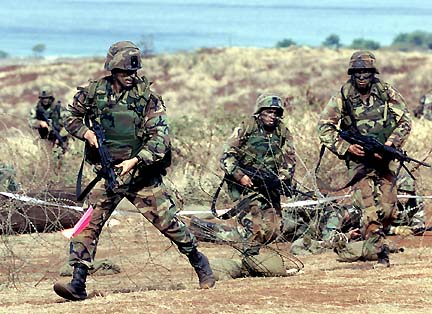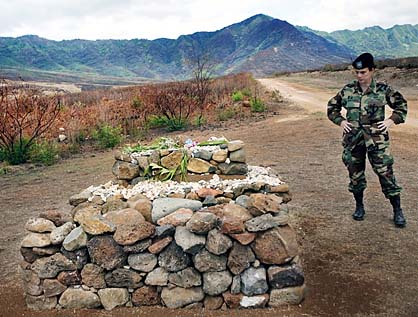
ASSOCIATED PRESS
Soldiers train during military exercises in Makua Valley. In 1998, Malama Makua took legal action that stopped the Army's live-fire training at Makua until shortly after the 9/11 terrorist attacks. The Makua Valley's cultural and environmental significance to Hawaii has forced the military to strike a balance between taking care of the land and providing soldiers with realistic training conditions.
Army treads Makua lightly
Legislative proposals in Congress
would create exemptions for
environmental laws
Within a few hundred feet of the entrance to the Army's Makua Military Reservation sits a hand-built altar, a thigh-high structure of rocks stacked upon rocks as wide as a kitchen table.
Though it's just a dot within the valley's 4,190 acres, the sacred "ahu" serves as a reminder to the Army of its responsibility to protect the land that native Hawaiians had cared for long before the first round of ammunition was fired there.
The altar was built two years ago by native Hawaiian groups who reached an agreement with the Army that allows them controlled access to Makua Valley for cultural purposes.
On Oahu's Leeward Coast, the rugged valley is off limits to other civilians.
"We want to do what's best for Makua Valley," said Alvin Char, chief of the environmental division of U.S. Army Garrison Hawaii. "It's vital for training, but we think we can have the training missions and malama (take care of) Makua as well."
Beyond the cultural significance of Makua Valley is its environmental significance.
ASSOCIATED PRESS
Maj. Stacy Bathrick, a public relations officer for the U.S. Army, views an "ahu" altar near the entrance of the Makua Valley Military Reservation, built by native Hawaiian groups who reached an agreement with the Army allowing them controlled access to Makua Valley for cultural purposes.
In 1998, a local preservation group called Malama Makua took legal action that stopped the Army's live-fire training at Makua until shortly after the 9/11 terrorist attacks.
Lawyers for the group agreed the Army needed the valley for training during the war on terrorism, and the Army agreed to limit its live-fire training in the valley and the types of ammunition it uses.
As the only live-fire training area on Oahu capable of adequately preparing company-size units, the Army considers Makua Valley critical to training.
But the valley's cultural and environmental significance to Hawaii also has forced the military to strike a balance between taking care of the land and providing soldiers with realistic training conditions.
"Paying attention to the environment and being aware of impact to the environment is critical to continue training here in Hawaii," said Kapua Kawelo, a biologist in the Army's environmental division who helps identify and preserve endangered species and critical habitat.
Environmental issues within the military are being raised on Capitol Hill this month as the Department of Defense pushes for exemptions to some of the nation's key environmental laws, claiming they hamper the military's ability to train in peace as it fights in war.
The White House-backed package first was introduced last year and contained eight provisions. Congress passed three last year, and the Pentagon is seeking passage of the remaining five. House and Senate versions of the legislation are being reconciled in conference committee.
Environmentalists are vehemently opposed to the proposal, calling it unwarranted. Some allege it is part of an administration effort to weaken the nation's environmental laws.
At Makua Valley, environmental groups have praised some of the Army's environmental efforts but say more still needs to be done to preserve culturally sensitive sites.
"They've made some good efforts, but they're still missing the marks on the cultural sites," said Sparky Rodrigues, a spokesman for Malama Makua. "For years, they've denied that there's been cultural sites. That means they've been bombing and shooting at cultural sites for generations now."
Rodrigues said Malama Makua hopes to eventually have more access to the valley to identify, restore and maintain sites important to Hawaiians.
Although the Army's programs to look after natural and cultural resources didn't really get going until the mid 1990s, officials say they aggressively work to ensure that such sites are protected once discovered.
That goes for plant and animal life, too. The valley is home to federally designated critical habitat for protected plants, birds and snails.
Last month, the Earthjustice Legal Defense Fund, which represents Malama Makua, threatened to sue the Army again after a controlled burn in July raged out of control, burning half the valley and destroying scores of rare plants and 150 acres of critical habitat.
While many of the rare species are far enough out of the training area that they are unaffected by the exercises, some have been found closer to the training range.
In those instances, the Army incorporates the habitat as part of its training scenario by designating it as a mine field or some other hazard that soldiers would have to avoid, said Laurie Lucking, cultural resources manager for U.S. Army Garrison Hawaii.
Other times, the coordinates of a rare species are programmed into the Global Positioning System targeting technology of a particular weapon, prompting a warning to the soldier operating the equipment when a shell might do harm, she said.
In all, the Army spends between $1 million and $1.5 million a year on preservation efforts, Char said.
Some of the most important work in the preservation effort doesn't require any money.
"We talk to different groups -- we're constantly trying to identify people with ties to these areas," Lucking said. "You just learn to speak to the right people in order to get a handle on the spiritually important areas, as well as the archaeological sites and just the culture in general.
"It's a dialogue."

